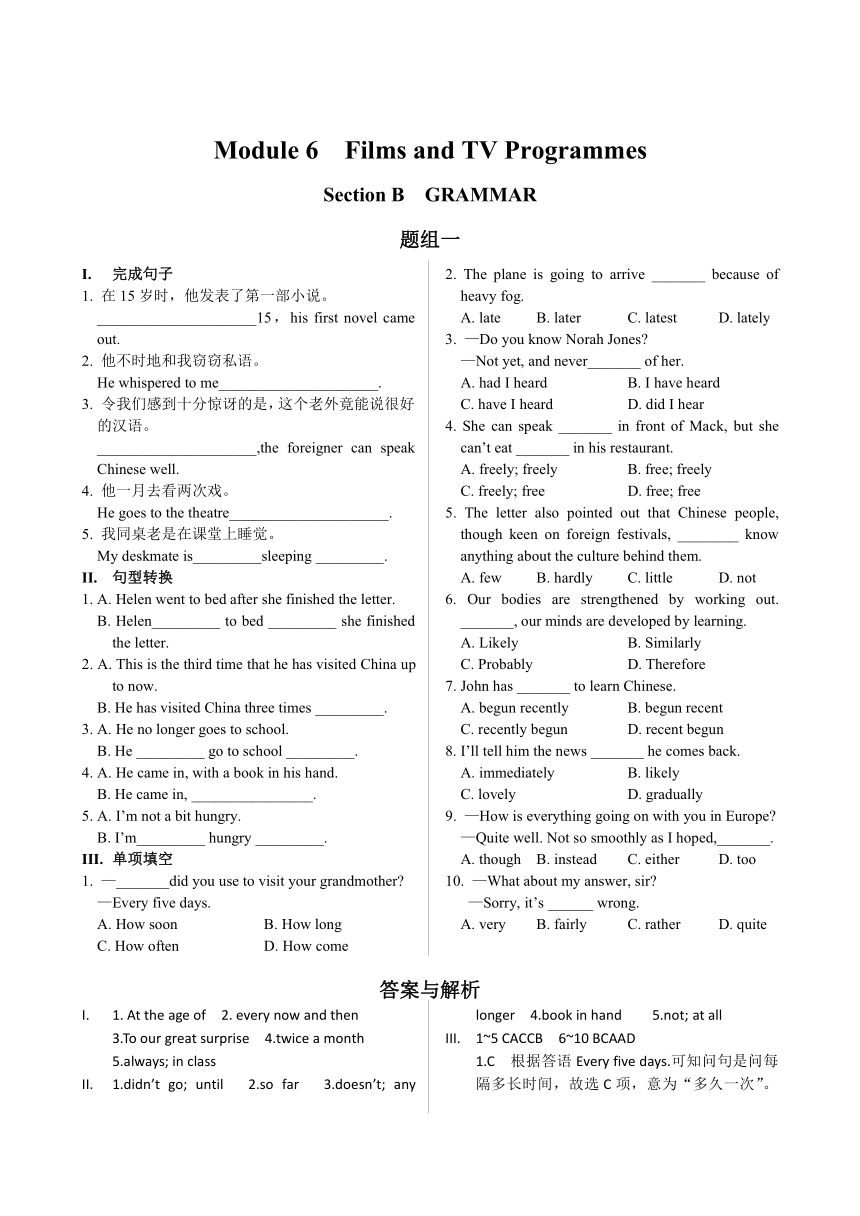2013-2014学年高一英语外研版必修二Module 6 Section B 同步练测(含答案解析)
文档属性
| 名称 | 2013-2014学年高一英语外研版必修二Module 6 Section B 同步练测(含答案解析) |

|
|
| 格式 | zip | ||
| 文件大小 | 19.1KB | ||
| 资源类型 | 教案 | ||
| 版本资源 | 外研版 | ||
| 科目 | 英语 | ||
| 更新时间 | 2014-02-17 00:00:00 | ||
图片预览

文档简介
Module 6 Films and TV Programmes
Section B GRAMMAR
题组一
完成句子
1. 在15岁时,他发表了第一部小说。
_____________________15,his first novel came out.
2. 他不时地和我窃窃私语。
He whispered to me_____________________.
3. 令我们感到十分惊讶的是,这个老外竟能说很好的汉语。
_____________________,the foreigner can speak Chinese well.
4. 他一月去看两次戏。
He goes to the theatre_____________________.
5. 我同桌老是在课堂上睡觉。
My deskmate is_________sleeping _________.
II. 句型转换
1. A. Helen went to bed after she finished the letter.
B. Helen_________ to bed _________ she finished the letter.
2. A. This is the third time that he has visited China up to now.
B. He has visited China three times _________.
3. A. He no longer goes to school.
B. He _________ go to school _________.
4. A. He came in, with a book in his hand.
B. He came in, ________________.
5. A. I’m not a bit hungry.
B. I’m_________ hungry _________.
III. 单项填空
1. —_______did you use to visit your grandmother?
—Every five days.
A. How soon B. How long
C. How often D. How come
2. The plane is going to arrive _______ because of heavy fog.
A. late B. later C. latest D. lately
3. —Do you know Norah Jones?
—Not yet, and never_______ of her.
A. had I heard B. I have heard
C. have I heard D. did I hear
4. She can speak _______ in front of Mack, but she can’t eat _______ in his restaurant.
A. freely; freely B. free; freely
C. freely; free D. free; free
5. The letter also pointed out that Chinese people, though keen on foreign festivals, ________ know anything about the culture behind them.
A. few B. hardly C. little D. not
6. Our bodies are strengthened by working out. _______, our minds are developed by learning.
A. Likely B. Similarly
C. Probably D. Therefore
7. John has _______ to learn Chinese.
A. begun recently B. begun recent
C. recently begun D. recent begun
8. I’ll tell him the news _______ he comes back.
A. immediately B. likely
C. lovely D. gradually
9. —How is everything going on with you in Europe?
—Quite well. Not so smoothly as I hoped,_______.
A. though B. instead C. either D. too
10. —What about my answer, sir?
—Sorry, it’s ______ wrong.
A. very B. fairly C. rather D. quite
答案与解析
I. 1. At the age of 2. every now and then
3.To our great surprise 4.twice a month
5.always; in class
1.didn’t go; until 2.so far 3.doesn’t; any longer 4.book in hand 5.not; at all
III. 1~5 CACCB 6~10 BCAAD
1.C 根据答语Every five days.可知问句是问每隔多长时间,故选C项,意为“多久一次”。how soon意为“多久”,经常用在将来时态的句子中;how long意为“多长时间”;how come意为“怎么会”。
2.A 句意:因为大雾,飞机将晚点到达。late“晚地,迟地”;later“后来”;latest“最新的”;lately“近来”。根据题意可知,选A项。
3.C never等表示否定意义的词放在句首,句子要部分倒装,再根据上一句的时态,可知选C
4.C
5.B 句意为:这封信同样也指出,中国人虽然热衷于外国节日,但却几乎不知道节日背后的文化。在that引导的宾语从句中,主语为Chinese people,know为谓语动词,though keen on foreign festivals为省略了主语(Chinese people)的让步状语从句,因此空白处需要填表达否定意义的副词hardly,修饰动词know。
6.B
7.C recently可置于句首或句尾,也可放在句中,但要置于实义动词前,助动词后。
8.A
9.A 根据题意可知,此处表示“尽管”没有我希望的那样顺利。
10.D 本题考查副词的用法。考生往往会从修饰的褒、贬上去考虑,于是误选C;而事实上,wrong是不可分级的形容词,前面只能用quite修饰,意思是:完全错了。
题组二 I.用所给词的适当形式填空
1. She looked ______ at the news and looked ______ at the picture of her lost son. (sad)
2. The novel is ______ (easy) enough for the high school students to read.
3. These apples taste ______ and sell______(good).
4. It's been raining ______ (continuous) for three days.
5. He jumps ______ (high).
II.单项填空
1. He doesn't ______ have foreigners in his restaurant.
A. soon B. seldom
C. often D. never
2.—Is he always late for class?
—Yes, he______.
A. is always B. always is
C. does always D. always does
3. —You keep on coughing. What's the matter?
—Oh, I've got a cold. Nothing serious, ______.
A. yet B. though
C. really D. anyway
4. Even father was ______ moved by the film.
A. deeply B. deep
C. loud D. loudly
5. They did their experiments ______.
A. carefully in the lab yesterday
B. in the lab carefully yesterday
C. in the carefully lab yesterday
D. in the lab yesterday carefully
6. Alan is a careful driver, but he drives ______ of my friends.
A. more carefully
B. the most carefully
C. less carefully
D. the least carefully
7. My elder brother was taught to read by my mother and______, so was I.
A. especially B. usually
C. similarly D. exactly
8. —Do you often go to concerts?
—No. They are so expensive that we only listen to them ______.
A. frequently B. normally
C. occasionally D. mostly
9.—Would you mind turning down the music?
—Sorry, I'll do so ______ , sir.
A. suddenly B. recently
C. finally D. immediately
10.—Do you watch TV at night?
—______, if ever. I have a lot of work to do.
A. Usually B. Frequently
C. Rarely D. Finally
答案与解析
I. 1.sad; sadly 2.easy 3.good; well
4.continuously 5.high
II. 1.C 句意:在他的餐馆里很少有外国人。often“经常”,符合句意。soon“不久”;seldom“几乎不”,表示否定含义;never“从不”,表示否定含义。
B be late for class意为“上课迟到”,根据问句可排除C、D两项。频度副词一般用在be动词之后,但在简答句中,通常放在be动词之前。
B yet放在句末时,意为“仍,至今”;though作副词用时,常放在句末,意为“然而,不过,但是”;really意为“真正地”;anyway意为“无论如何”。
A deeply常表示情感上的深度;deep表示空间深度。
A 如果一个句子中有多个状语,如时间、地点、方式等,其顺序是“方式—地点—时间”,故选A项。
D 句意:Alan开车很小心,但在我的朋友中,他还是最不小心的。本题主要考查副词的最高级。后文的范围不是两者,要用最高级。由转折连词but可知,下文表示否定含义,因此选D项。
C 句意:我哥哥是由妈妈教他读书的,同样地,我也是。especially意为“尤其,特别”;usually意为“通常”;similarly意为“同样地”;exactly意为“确切地,完全地”。只有C项符合题意,故C项正确。
C 根据句中的so expensive可知,只是偶尔去看音乐会。frequently意为“经常地”;normally意为“正常地”;occasionally意为“偶尔”;mostly意为“主要地,大部分地”。故C项正确。
D 答语意为:抱歉,先生,我马上把音乐关小点。suddenly意为“突然地”;recently意为“近来”;finally意为“最后”;immediately意为“立刻,马上”。
C 句意:“你晚上看电视吗?”“如果看的话也不经常。我有很多工作要做。”rarely意为“极少,不常”,表示否定意义,符合题意,故C项正确。
